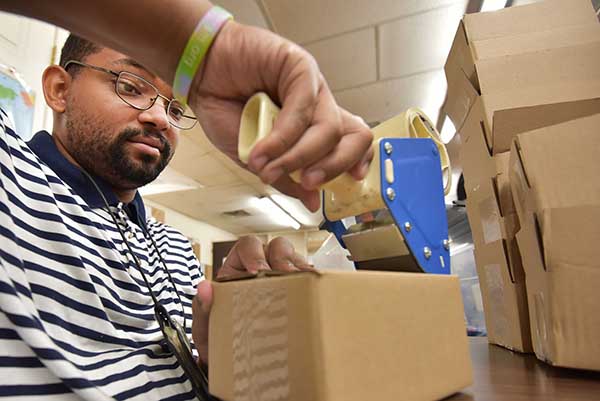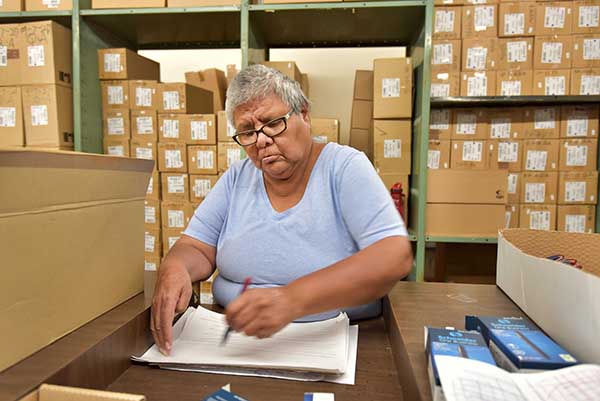Supplier open houses in first year create partnerships between Sandia, business
Most Sandia employees probably haven’t wondered where the office products on their desks came from, but if they were to follow the supply chain, they just might find a story behind those pens and binders.
All Schneider pens, for example, come from Stride Inc., an Albuquerque company where some employees with disabilities take long bus rides to work, and then package, assemble, and ship those supplies. Their bosses watch for them to arrive every day, embrace them with smiles, ask how they’ve been, then give them responsibilities in quality assurance, shipping, and receiving.
For years the small business has made its mission to hire people with special needs to manufacture products, some of which find their way to another Albuquerque-based business, Sandia Office Supply, the Labs’ office supplier. Recently Stride president and CEO Kerry Bertram turned to Sandia’s open house for businesses to figure out how to get more products made by its workers into the hands of the Labs’ workforce.

In the year since Sandia created open houses for businesses, more than 330 visitors from more than 260 companies have sought to learn more about doing business with the Labs, says supplier diversity advocate Eric Lochausen. Bertram was one of these visitors. She talked to Sandia’s Marie Myszkier, a supplier diversity advocate, and the conversation led to Stride getting a chance to put more of its products to use at the Labs.
Helping Stride work more closely with Sandia is one example of what organizers hope the open houses achieve for the Labs and New Mexico.
Open houses are held the second Tuesday of every month in two sessions, one in the morning and one in the afternoon. The first 20 minutes are dedicated to educating visitors about working with a federal contractor. The rest of the time is used for networking and matchmaking sessions, where business owners can speak with subcontract managers, supplier diversity advocates, other Sandia personnel and members of the Small Business Procurement Technical Assistance Program.
Why Stride?
“We’ve done business with Stride for years and years and years,” says Todd Sandoval of Albuquerque’s Sandia Office Supply. He says he likes the way Bertram does business and helps the Albuquerque community.
“And also the fact that they are a local manufacturer. I mean literally, they are the only local manufacturer represented in our catalog of more than 25,000 items. So it’s a big deal,” Sandoval says.
Stride’s story begins with Bertram’s mother, Barbara Brennan, who had a son with hydrocephalus. Joey never walked or talked, was blind by the time he was 3, and died shortly before his 8th birthday. That experience made Brennan want to help people with disabilities and give them a chance to work. She and her husband purchased RC Ink in 1988 and renamed the company Stride to highlight the strides employees make in their development and quest for independence.
“When my husband and I started the business, we knew there were a lot of people with disabilities who would make good workers, and we were right,” Brennan says.
On any given day, Vaden, who experienced health issues in college that led to a disability, works the blister card machine that packages items like pens. Peter, who is on the autism spectrum, packages items. He can pick up a handful of pens and know exactly how many he’s holding just by their weight, Bertram says. Diana, who was diagnosed with schizoaffective disorder, also packages supplies. She’s determined to confront discriminating stigmas surrounding mental illness. James, who is also on the autism spectrum, started as an assembler and was promoted to a shipping specialist. He backs up Victor, who was diagnosed with a communication disorder.
Everyone who works at Stride gets paid time off and retirement and is eligible for pay increases, Bertram says. Robert, diagnosed with epilepsy, worked his way up in the company and is now a member of the management team and no longer receives government assistance.
Open houses offer networking, sit-downs for suppliers

During a busy September open house, Sandia’s Small Business Program manager Del Salazar greeted New Mexico business owners and answered questions. Networking groups formed while visitors sipped coffee and picked up flyers for more information. Sandia advocates and subcontract managers sat down to personally talk with suppliers as well.
Representatives from the Waste Isolation Pilot Plant in Carlsbad, New Mexico, gave a presentation to visitors in September; a few months earlier, Sandia hosted representatives from Los Alamos National Laboratory in northern New Mexico. Del says Sandia has received positive comments about such educational portions of open houses.
“Each session is an opportunity to learn how to do business with Sandia” she says. “We also invite our resource partners and offer them the opportunity to provide education as well. The feedback from our suppliers is that the education component is value added to their visit with us.”
Open houses attract a wide array of businesses, from those who don’t know how to do federal contracting to those who are very seasoned. Marie says the Small Business Procurement Technical Assistance Program or the Small Business Administration will help, and they try to make sure all questions are answered.
“I believe the greatest success is providing small, local businesses the opportunity to actually meet Sandia subcontract managers and supplier diversity advocates,” Eric says. “Sandia has always seemed such a mystery for suppliers and they did not know how to initiate contact prior to the open houses.”